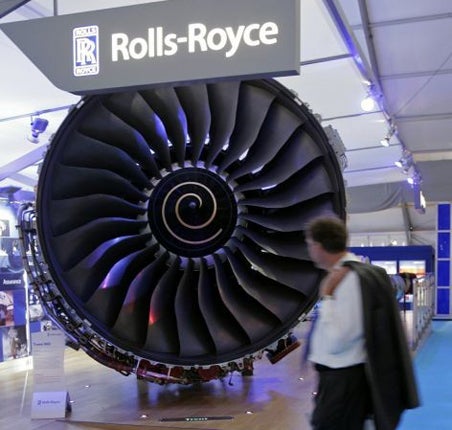Rolls-Royce faces legal action over engine failure

Your support helps us to tell the story
From reproductive rights to climate change to Big Tech, The Independent is on the ground when the story is developing. Whether it's investigating the financials of Elon Musk's pro-Trump PAC or producing our latest documentary, 'The A Word', which shines a light on the American women fighting for reproductive rights, we know how important it is to parse out the facts from the messaging.
At such a critical moment in US history, we need reporters on the ground. Your donation allows us to keep sending journalists to speak to both sides of the story.
The Independent is trusted by Americans across the entire political spectrum. And unlike many other quality news outlets, we choose not to lock Americans out of our reporting and analysis with paywalls. We believe quality journalism should be available to everyone, paid for by those who can afford it.
Your support makes all the difference.Qantas laid the groundwork yesterday for legal action against Rolls-Royce in the absence of a compensation deal after the engine explosion that grounded the airline's fleet of superjumbos last month.
The two companies are already in talks about the Trent 900 engine failure in early November that forced Qantas flight QF32 into an emergency landing in Singapore after shrapnel from the engine tore into the wing of the A380 passenger jet.
Two of the six Airbus A380s operated by Qantas are now back in service, but the airline's costs are estimated to be more than A$100m (£62m) already, even without taking reputational damage into account.
Qantas filed a statement of claim with the Federal Court of Australia yesterday allowing legal action against Rolls-Royce under the Trade Practices Act "if a commercial settlement is not possible" between the two parties.
"Today's action allows Qantas to keep all options available to the company to recover losses, as a result of the grounding of the A380 fleet and the operational constraints currently imposed on A380 services," the carrier said.
Rolls-Royce declined to comment on the move yesterday, although it is understood that the company is expecting a deal over costs. Last month's interim management statement warned of underlying profit growth for the full year "slightly lower than previously guided" because of the impact of the QF32 problems.
Meanwhile the two companies are still working closely on the inspection programme to establish the safety of all Trent 900 A380 engines in the Qantas fleet.
Under an "airworthiness directive" issues by the European Aviation Safety Agency in the aftermath of the explosion, the Trent 900s must be reviewed every 20 flying cycles. Qantas said yesterday it is instituting a further one-off inspection routine in line with the latest recommendations from the Australian Transport Safety Bureau (ATSB).
The ATSB alert followed detailed investigations of the QF32 engine, which revealed uneven boring in an oil tube. The weak tube wall cracked, allowing oil to escape and catch fire, causing the engine to explode.
In response to the ATSB recommendation, a spokesman for Rolls-Royce said: "The safety recommendation of the ATSB is consistent with what we have said before. We have instituted a regime of inspection, maintenance and removal which has assured safe operation. This programme has been agreed in collaboration with Airbus, our airline customers and the regulators."
Qantas's threat of court action reignites censure over Rolls-Royce's handling of the affair. In the aftermath of the explosion, critics said the company's chief executive, Sir John Rose, was not doing enough to reassure investors and the travelling public.
Howard Wheeldon, the senior strategist at BGC Partners, said yesterday that even with little lasting damage to Rolls-Royce's order book, the "minimal level of communication" from the company is no "easier to swallow". The lack of response to Qantas's latest move is also "a huge disappointment" to investors, Mr Wheeldon said.
There are 20 Trent 900-powered A380s in service, run by Qantas, Lufthansa and Singapore. Another 17 A380s flown by Air France and Emirates use different engines, made by GE and Pratt & Whitney.
Join our commenting forum
Join thought-provoking conversations, follow other Independent readers and see their replies
Comments